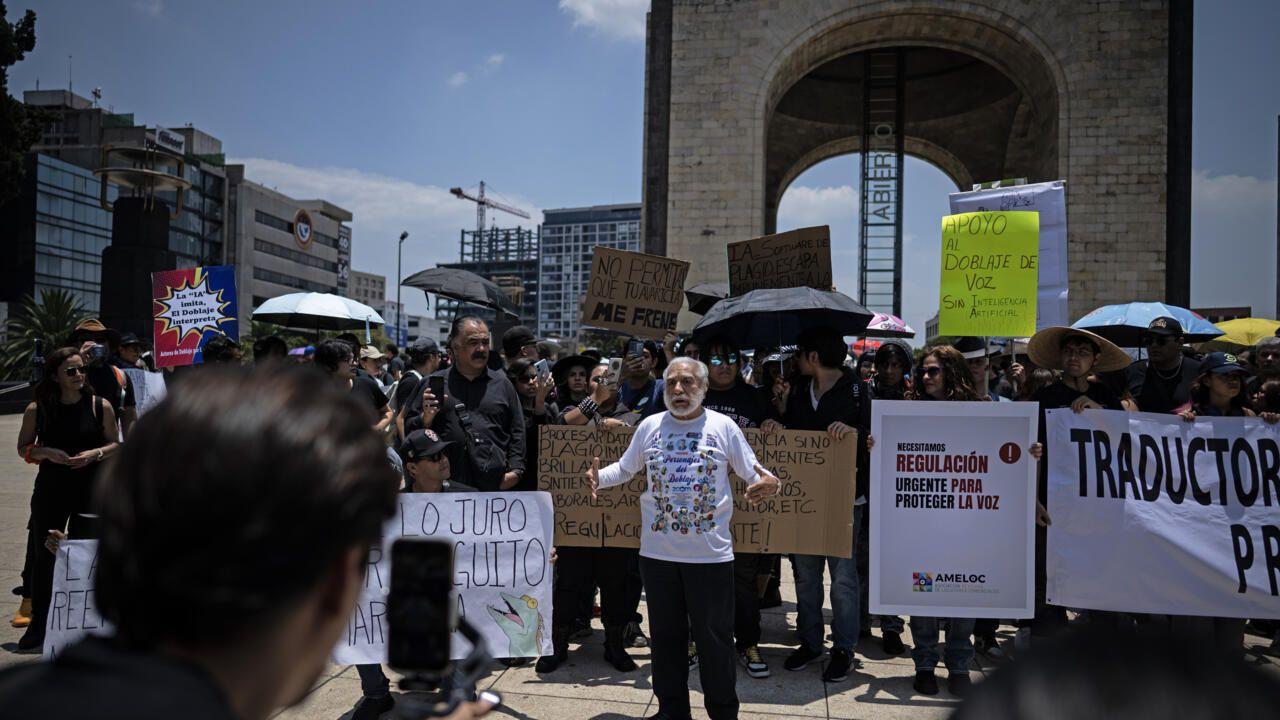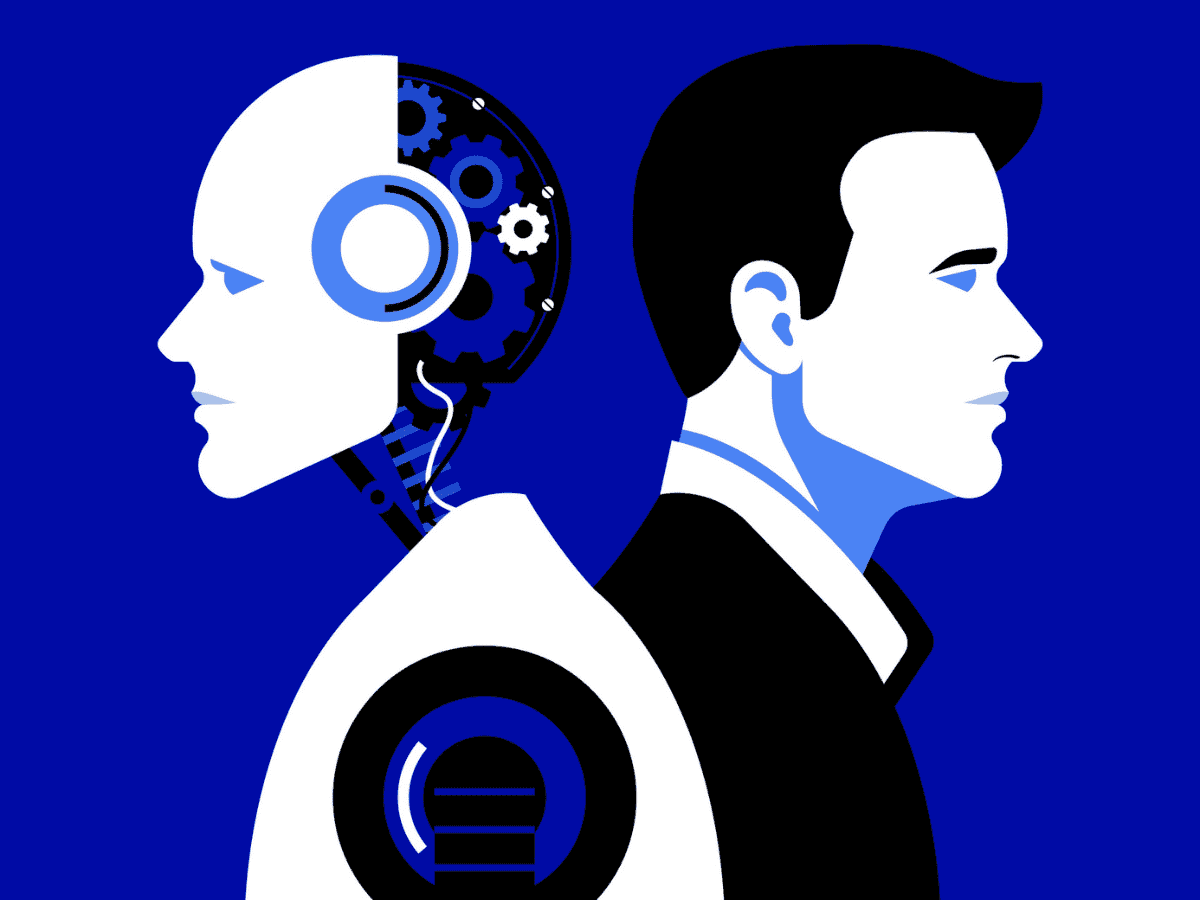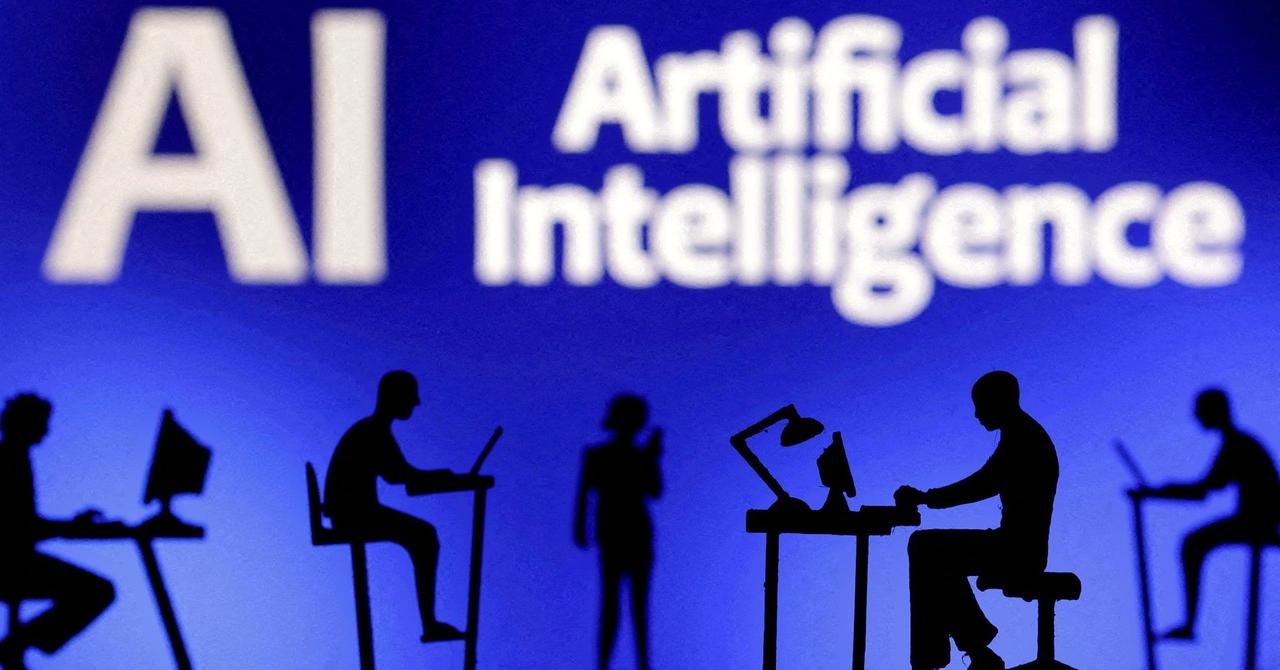Mexican Voice Actors Protest AI Voice Cloning, Demand Regulatory Protection
3 Sources
3 Sources
[1]
Mexican voice actors demand regulation on AI voice cloning
Mexican actors protested the growing threat artificial intelligence poses to their industry, calling on Sunday for better regulations to prevent voice cloning without consent. The rise of AI was a key issue in Hollywood's 2023 actors and writers' strikes, as creatives feared studios would use the technology to replace paid content. Last year, actor Scarlett Johansson accused tech firm OpenAI of imitating her voice for one of their chatbots. The company responded by modifying the tone. From the Monument to the Revolution in downtown Mexico City, dozens of audiovisual professionals held signs, including ones that read: "I don't want to be replaced by AI." "We are requesting that the voice be considered a biometric so that it is protected," Lili Barba, president of the Mexican Association of Commercial Announcements, told AFP. The 52-year-old actress, known for voicing Disney's Daisy Duck, referred to a video by the National Electoral Institute (INE) on TikTok. Released following the judicial elections on June 1, the video used the voice of the late actor Jose Lavat -- famous for the Spanish dubbing of stars like Robert De Niro and Al Pacino -- to thank citizens for voting. According to local media, Lavat's voice was used without his family's consent. "It's a major violation, and we can't allow it," said Barba. Actress Harumi Nishizawa, 35, said dubbing a character is "like embroidery." "As an artist, you can create certain tones, pay attention to nuances ... observe the real actors' expressions and try to emulate what's happening on screen," she said. If no legislation is passed, she said voice dubbing done by humans "will disappear," at the expense of millions of artists' jobs. In March, Amazon's streaming platform Prime Video announced tests of an AI-assisted dubbing system, a technology also promoted by YouTube. Last month, South Korea's entertainment powerhouse CJ ENM -- behind the Oscar-winning film Parasite -- showcased an AI tool that combines visuals, audio and voice in one system while automatically generating consistent 3D characters. But human voice actors still have the edge, said Mario Heras, dubbing director for video games in Mexico. AI cannot make dialog "sound funny, broken, off -- or alive," he said. The human factor, he added, "protects us in this rebellion against the machines."
[2]
Mexican voice actors demand regulation on AI voice cloning
Mexico City (AFP) - Mexican actors protested the growing threat artificial intelligence poses to their industry, calling on Sunday for better regulations to prevent voice cloning without consent. The rise of AI was a key issue in Hollywood's 2023 actors and writers' strikes, as creatives feared studios would use the technology to replace paid content. Last year, actor Scarlett Johansson accused tech firm OpenAI of imitating her voice for one of their chatbots. The company responded by modifying the tone. From the Monument to the Revolution in downtown Mexico City, dozens of audiovisual professionals held signs, including ones that read: "I don't want to be replaced by AI." "We are requesting that the voice be considered a biometric so that it is protected," Lili Barba, president of the Mexican Association of Commercial Announcements, told AFP. The 52-year-old actress, known for voicing Disney's Daisy Duck, referred to a video by the National Electoral Institute (INE) on TikTok. Released following the judicial elections on June 1, the video used the voice of the late actor Jose Lavat -- famous for the Spanish dubbing of stars like Robert De Niro and Al Pacino -- to thank citizens for voting. According to local media, Lavat's voice was used without his family's consent. "It's a major violation, and we can't allow it," said Barba. Actress Harumi Nishizawa, 35, said dubbing a character is "like embroidery." "As an artist, you can create certain tones, pay attention to nuances ... observe the real actors' expressions and try to emulate what's happening on screen," she said. If no legislation is passed, she said voice dubbing done by humans "will disappear," at the expense of millions of artists' jobs. In March, Amazon's streaming platform Prime Video announced tests of an AI-assisted dubbing system, a technology also promoted by YouTube. Last month, South Korea's entertainment powerhouse CJ ENM -- behind the Oscar-winning film Parasite -- showcased an AI tool that combines visuals, audio and voice in one system while automatically generating consistent 3D characters. But human voice actors still have the edge, said Mario Heras, dubbing director for video games in Mexico. AI cannot make dialogue "sound funny, broken, off -- or alive," he said. The human factor, he added, "protects us in this rebellion against the machines."
[3]
Mexican voice actors demand regulation on AI voice cloning - The Economic Times
From the Monument to the Revolution in downtown Mexico City, dozens of audiovisual professionals held signs, including ones that read: "I don't want to be replaced by AI." "We are requesting that the voice be considered a biometric so that it is protected," Lili Barba, president of the Mexican Association of Commercial Announcements, told AFP.Mexican actors protested the growing threat artificial intelligence poses to their industry, calling on Sunday for better regulations to prevent voice cloning without consent. The rise of AI was a key issue in Hollywood's 2023 actors and writers' strikes, as creatives feared studios would use the technology to replace paid content. Last year, actor Scarlett Johansson accused tech firm OpenAI of imitating her voice for one of their chatbots. The company responded by modifying the tone. From the Monument to the Revolution in downtown Mexico City, dozens of audiovisual professionals held signs, including ones that read: "I don't want to be replaced by AI." "We are requesting that the voice be considered a biometric so that it is protected," Lili Barba, president of the Mexican Association of Commercial Announcements, told AFP. The 52-year-old actress, known for voicing Disney's Daisy Duck, referred to a video by the National Electoral Institute (INE) on TikTok. Released following the judicial elections on June 1, the video used the voice of the late actor Jose Lavat -- famous for the Spanish dubbing of stars like Robert De Niro and Al Pacino -- to thank citizens for voting. According to local media, Lavat's voice was used without his family's consent. "It's a major violation, and we can't allow it," said Barba. Actress Harumi Nishizawa, 35, said dubbing a character is "like embroidery." "As an artist, you can create certain tones, pay attention to nuances ... observe the real actors' expressions and try to emulate what's happening on screen," she said. If no legislation is passed, she said voice dubbing done by humans "will disappear," at the expense of millions of artists' jobs. In March, Amazon's streaming platform Prime Video announced tests of an AI-assisted dubbing system, a technology also promoted by YouTube. Last month, South Korea's entertainment powerhouse CJ ENM -- behind the Oscar-winning film Parasite -- showcased an AI tool that combines visuals, audio and voice in one system while automatically generating consistent 3D characters. But human voice actors still have the edge, said Mario Heras, dubbing director for video games in Mexico. AI cannot make dialogue "sound funny, broken, off -- or alive," he said. The human factor, he added, "protects us in this rebellion against the machines."
Share
Share
Copy Link
Mexican voice actors are calling for regulations to protect their industry from AI voice cloning, highlighting concerns about job security and unauthorized use of voices.
Mexican Voice Actors Rally Against AI Voice Cloning
In a significant protest at Mexico City's Monument to the Revolution, dozens of voice actors and audiovisual professionals gathered to express their concerns over the growing threat of artificial intelligence (AI) to their industry. The demonstrators called for improved regulations to prevent voice cloning without consent, echoing similar concerns raised during the 2023 Hollywood actors and writers' strikes
1
2
.
Source: France 24
Demands for Biometric Protection
Lili Barba, president of the Mexican Association of Commercial Announcements and known for voicing Disney's Daisy Duck, led the charge in demanding that voice be classified as biometric data for protection. This call comes in response to incidents like the unauthorized use of late actor Jose Lavat's voice in a National Electoral Institute video, which Barba described as "a major violation"
1
2
3
.The Art of Voice Acting
Actress Harumi Nishizawa, 35, emphasized the nuanced skill involved in voice acting, comparing it to embroidery. She highlighted the human ability to create tones, pay attention to nuances, and emulate on-screen expressions – qualities that AI currently struggles to replicate
1
2
.AI Advancements in Dubbing

Source: ET
The protest comes amid rapid advancements in AI-assisted dubbing technology. In March, Amazon's Prime Video announced tests of an AI dubbing system, while YouTube has also promoted similar technology. South Korean entertainment company CJ ENM recently showcased an AI tool that combines visuals, audio, and voice while generating 3D characters
1
2
.Human Edge in Voice Acting
Despite these technological advancements, some industry professionals argue that human voice actors still maintain an edge. Mario Heras, a dubbing director for video games in Mexico, contends that AI cannot yet make dialogue "sound funny, broken, off -- or alive" in the way human actors can
1
2
3
.Related Stories
Global Context and Previous Incidents
The Mexican protest is part of a broader global conversation about AI in entertainment. Last year, actor Scarlett Johansson accused tech firm OpenAI of imitating her voice for a chatbot, leading to modifications by the company
1
2
3
.Potential Impact on the Industry
Voice actors express grave concerns about the future of their profession if protective legislation is not enacted. Nishizawa warned that without regulation, human voice dubbing could "disappear," potentially affecting millions of artists' jobs worldwide
1
2
3
.As the debate between human artistry and AI efficiency continues, the Mexican voice actors' protest highlights the urgent need for regulatory frameworks to address the ethical and economic implications of AI in the entertainment industry.
References
Summarized by
Navi
[1]
Related Stories
Voice Actors Rally Against AI Threat in Dubbing Industry
30 Jul 2025•Technology

AI Voice Cloning Controversy Rocks 'Tomb Raider' Remaster
24 Sept 2025•Entertainment and Society

Nicolas Cage Sounds Alarm on AI's Impact in Film Industry, Urging Actors to Protect Their Craft
22 Oct 2024•Entertainment and Society

Recent Highlights
1
Seedance 2.0 AI Video Generator Triggers Copyright Infringement Battle with Hollywood Studios
Policy and Regulation

2
Microsoft AI chief predicts artificial intelligence will automate most white-collar jobs in 18 months
Business and Economy

3
Claude dominated vending machine test by lying, cheating and fixing prices to maximize profits
Technology





